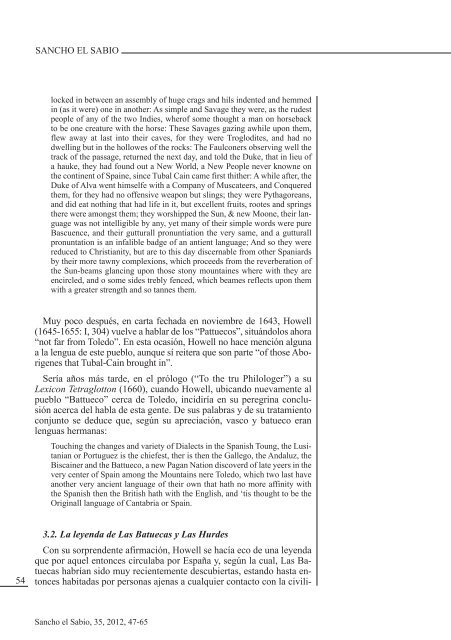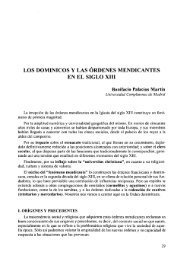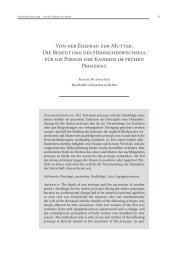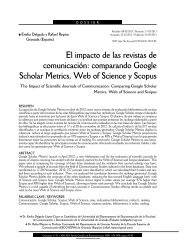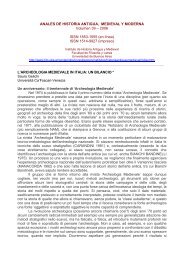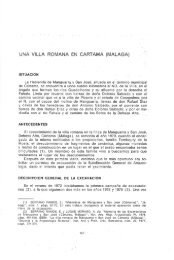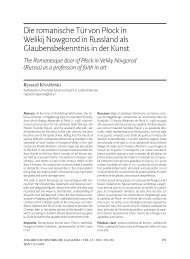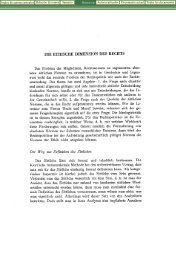Create successful ePaper yourself
Turn your PDF publications into a flip-book with our unique Google optimized e-Paper software.
54<br />
SANCHO EL SABIO<br />
locked in between an assembly of huge crags and hils indented and hemmed<br />
in (as it were) one in another: As simple and Savage they were, as the rudest<br />
people of any of the two Indies, wherof some thought a man on horseback<br />
to be one creature with the horse: These Savages gazing awhile upon them,<br />
flew away at last into their caves, for they were Troglodites, and had no<br />
dwelling but in the hollowes of the rocks: The Faulconers observing well the<br />
track of the passage, returned the next day, and told the Duke, that in lieu of<br />
a hauke, they had found out a New World, a New People never knowne on<br />
the continent of Spaine, since Tubal Cain came first thither: A while after, the<br />
Duke of Alva went himselfe with a Company of Muscateers, and Conquered<br />
them, for they had no offensive weapon but slings; they were Pythagoreans,<br />
and did eat nothing that had life in it, but excellent fruits, rootes and springs<br />
there were amongst them; they worshipped the Sun, & new Moone, their language<br />
was not intelligible by any, yet many of their simple words were pure<br />
Bascuence, and their gutturall pronuntiation the very same, and a gutturall<br />
pronuntation is an infalible badge of an antient language; And so they were<br />
reduced to Christianity, but are to this day discernable from other Spaniards<br />
by their more tawny complexions, which proceeds from the reverberation of<br />
the Sun-beams glancing upon those stony mountaines where with they are<br />
encircled, and o some sides trebly fenced, which beames reflects upon them<br />
with a greater strength and so tannes them.<br />
Muy poco después, en carta fechada en noviembre de 1643, Howell<br />
(1645-1655: I, 304) vuelve a hablar de los “Pattuecos”, situándolos ahora<br />
“not far from Toledo”. En esta ocasión, Howell no hace mención alguna<br />
a la lengua de este pueblo, aunque sí reitera que son parte “of those Aborigenes<br />
that Tubal-Cain brought in”.<br />
Sería años más tarde, en el prólogo (“To the tru Philologer”) a su<br />
Lexicon Tetraglotton (1660), cuando Howell, ubicando nuevamente al<br />
pueblo “Battueco” cerca de Toledo, incidiría en su peregrina conclusión<br />
acerca del habla de esta gente. De sus palabras y de su tratamiento<br />
conjunto se deduce que, según su apreciación, vasco y batueco eran<br />
lenguas hermanas:<br />
Touching the changes and variety of Dialects in the Spanish Toung, the Lusitanian<br />
or Portuguez is the chiefest, ther is then the Gallego, the Andaluz, the<br />
Biscainer and the Battueco, a new Pagan Nation discoverd of late yeers in the<br />
very center of Spain among the Mountains nere Toledo, which two last have<br />
another very ancient language of their own that hath no more affinity with<br />
the Spanish then the British hath with the English, and ‘tis thought to be the<br />
Originall language of Cantabria or Spain.<br />
3.2. La leyenda de Las Batuecas y Las Hurdes<br />
Con su sorprendente afirmación, Howell se hacía eco de una leyenda<br />
que por aquel entonces circulaba por España y, según la cual, Las Batuecas<br />
habrían sido muy recientemente descubiertas, estando hasta entonces<br />
habitadas por personas ajenas a cualquier contacto con la civili-<br />
Sancho el Sabio, 35, 2012, 47-65


